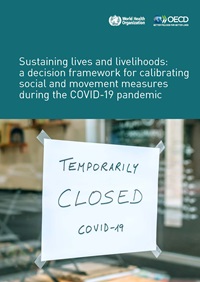By World Health Organization and Organization for Economic Co-operation and Development
Public health and social measures are defined as “measures or actions by individuals, institutions, communities, local and national governments and international bodies to slow or stop the spread of an infectious disease”. Social and physical distancing and restrictions on international travel (thereafter “social and movement measures”) have been introduced to reduce the risk of acquiring or spreading infection with COVID-19 in various community settings. Whilst the risk of infection to COVID-19 decreases, social and movement measures exacerbate the economic slowdown and can worsen socioeconomic inequalities.
Calibrating social and movement measures is complex as it has direct and indirect health and economic impacts, across different subpopulations, now and in the future, and is characterized by uncertainty, urgency, need for multiple levels of decision-making.
Schools? Public transportation? Stores? Restaurants? Factories? Gatherings?
What? When? For how long? How?
In this type of context, there is no right or wrong answer and no one-size-fits-all strategy. But inclusive decision making, systematically informed by data and communicated clearly will promote transparency in the process, increase the legitimacy of the decisions and promote trust between the population and the decision-makers.
The World Health Organization and the Organisation for Economic Co-operation and Development describe, in their joint publication, a decision framework to assist countries as they continue to calibrate social and movement measures until there is widespread population coverage with the vaccine.
Moderator: Dr. Tessa Tan-Torres Edejer, Coordinator, Health systems governance and financing, WHO
14:00-14:10 Opening remarks and introduction
Dr. Ibrahim Soce-Fall, Assistant Director-General, Emergency Response , WHO
14:10-14:25 Presentation of key messages of the report
Dr. Edith Patouillard, Senior health economist, Health systems governance and financing, WHO
Moderated panel of reactors:
14:50-15:00 Closing remarks Mr. Ulrik Vestergaard Knudsen, Deputy Secretary General, OECD

